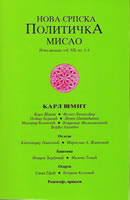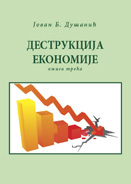| NSPM in English | |||
Ukraine’s Counterrevolution |
 |
 |
 |
| понедељак, 25. јануар 2010. | |
|
(The National Interest, 22.1.2010)
But Yushchenko’s performance in office was widely viewed as a disaster; in Sunday’s presidential election, Yushchenko finished in fifth place with a dismal 5.4 percent. One of his former supporters said simply: “He did not live up to our expectations.” Yushchenko’s failure serves as a stark reminder of the risks when Washington intervenes in foreign politics. Ukraine was one of many lands absorbed by both the Russian Empire and Soviet Union. The collapse of the latter allowed Ukraine to win its independence. But the break was never clean. Nearly one-fifth of Ukrainians are ethnic Russians. They make up a majority in the Crimea, a territory transferred from Russia when Ukrainian Nikita Khrushchev was ascendant in the Soviet Communist Party—and at a time when the transfer was largely symbolic. Moscow has staked its claim on retaining its Crimean naval base at Sevastopol. Moreover, Ukrainian politics has been marred by corruption, vote fraud, brutal infighting and violence. Despite the Manichean prism through which Westerners tend to view foreign political contests, most leading Ukrainian politicians appear to be shades of gray rather than black and white. Ukraine’s George Washington, Thomas Jefferson and John Adams have yet to make an appearance. Similarly convoluted was the December 2004 poll. Washington-backed Yushchenko had his own big-business allies, just like Viktor Yanukovich, who was attacked for being a tool of financial oligarchs. Moreover, Yushchenko was allied with Yulia Tymoshenko, a financial baroness whose wealth seemed no cleaner than that of many of Ukraine’s other business moguls. Moreover, though Yushchenko was more obviously pro-Western than Yanukovich, in practice the differences were smaller than advertised. Even the latter advocated membership in the European Union, for instance, and Yushchenko never found public or political support for his plan to join NATO. Even worse, Yushchenko proved to be one of the least competent politicians ever elected head of state. Despite the euphoria of more liberal and Western-leaning elites at Yushchenko’s victory, Ukrainian politics quickly turned into a national soap opera. Yushchenko and Tymoshenko periodically broke up and reunited; Yushchenko switched dance partners, making Yanukovich prime minister. Yushchenko even accused former ally Tymoshenko of treason and blamed his poisoning in 2004 on onetime political allies rather than the Russians, the initial suspects. In the meantime the economy stagnated, reform halted, relations with Russia deteriorated, and the Ukrainian people grew frustrated. Yanukovich headed the opposition with the largest party in parliament as Yushchenko’s party imploded. Tymoshenko’s reputation also took a hit in the resulting political and economic imbroglio. In the latest vote, Yanukovich finished first with about 35 percent compared to Tymoshenko’s 25 percent. She could still win the runoff on February 7—some observers believe she is well-positioned to pick up more votes from the losers, though one-on-one polls have given him the edge. But the Orange Revolution is dead. Tymoshenko has indicated her interest in maintaining good relations with Moscow and temporized on the question of joining NATO, which is opposed by a majority of Ukrainians. For those outside Ukraine, at least, it doesn’t matter much who becomes Ukraine’s next president. It especially does not matter to America. The Ukrainian Diaspora in America has long fought for its homeland. But Kiev’s status, policies, and orientation aren’t of significant interest to Washington. The Soviet Union lost the Cold War. Russia won’t be able to pick up the pieces, irrespective of its relationship with Ukraine. Creating an alliance with an independent Kiev would strengthen America against Moscow, but for what purpose? The idea of a Russian attack on the United States is a paranoid fantasy. Russia, with or without Ukraine, would lose overwhelmingly. The Putin government wants to be treated with respect internationally; it takes Russian security very seriously, but has only limited ambitions. Whatever Moscow’s attitude toward the states neighboring its border which had been part of the Soviet Union, there is no realistic chance of a Russian attack on the other nations of Europe or beyond. In fact, expanding NATO to Russia’s border has made Moscow more paranoid and confrontational. Georgia’s hope for Western protection from Russian military action proved stillborn: no sane American policy maker would risk Washington to protect Tbilisi. There is no more enthusiasm for promising to go to war over Ukraine. Attempting to manipulate Ukrainian elections may be less dangerous than offering Ukraine security guarantees, but it has proved to be even less successful. Not that this should surprise anyone. U.S. officials have meddled in other nations for decades, but too often have had only a limited understanding of local politics and politicians. So it was in 2004. Ukraine was not going to become either an American or a Russian satellite, irrespective of who was elected. As Yushchenko dramatically demonstrated, even the most committed pro-American candidate could not force his countrymen in a direction which they opposed. Moreover, even when the United States is able to buy or rent a friendly politician, there is no guarantee that he or she will stay bought. Tymoshenko was initially part of the supposedly pro-American team. However, she ended up making peace with Russia, opposing Washington’s push for Ukraine to join NATO, cooperating with Yanukovich, and being called a traitor by Yushchenko. There’s no reason to expect Tymoshenko’s reliability—from Washington’s viewpoint—to improve if she wins the runoff. Further, local politicians usually will put their own nations and interests first. In the afterglow of the Orange Revolution, it was easy for politicians to be unabashedly pro-European and pro-American. However, without shame Tymoshenko quickly adjusted to political reality and made peace with Moscow. Yanukovich, attacked as Russia’s candidate, supported joining the European Union and noticeably distanced himself from Moscow; during the recent campaign he even criticized Tymoshenko for allegedly yielding too much to the Russians in natural-gas negotiations. U.S. meddling in other nations also can spark national and regional instability. America is not alone in attempting to influence events in other countries, of course. But even if Washington’s objectives are more laudable-supporting (sometimes) more democratic forces, for instance-the consequences still often are counterproductive. There are many reasons U.S. relations with Russia soured; promoting a pro-Western revolution in Moscow’s big southern neighbor exacerbated Moscow’s existing paranoia. Washington has a long history of intervening in other countries. While the consequences have not always been disastrous, the results most often have been disappointing. Even when the United States got the foreign governments it desired, Washington rarely enjoyed the geopolitical benefits it expected. Such has been the process in Ukraine. Who is likely to win Ukraine’s presidency? It shouldn’t matter much to Washington. The last time America meddled in Ukrainian politics it received five years of political chaos. There’s no reason to look for a return performance, in Ukraine or elsewhere. |
Од истог аутора
- France Falls Again
- The End of Nonproliferation
- Riyadh Scores One for Tehran
- Fear and Exhilaration in America
- Conservatives for Empire
- Departing Europe
- Bankrupt Empire
- Europe Doesn’t Matter
- A War We Can’t Afford
- Holier Than Thou
- Guns & Butter
- The China Syndrome
- More Friends, More War
- The Russian Hangover
- Playing with fire
Остали чланци у рубрици
- Playing With Fire in Ukraine
- Kosovo as a res extra commercium and the alchemy of colonization
- The Balkans XX years after NATO aggression: the case of the Republic of Srpska – past, present and future
- Из архиве - Remarks Before the Foreign Affairs Committee of the European Parliament
- Dysfunction in the Balkans - Can the Post-Yugoslav Settlement Survive?
- Serbia’s latest would-be savior is a modernizer, a strongman - or both
- Why the Ukraine Crisis Is the West’s Fault
- The Ghosts of World War I Circle over Ukraine
- Nato's action plan in Ukraine is right out of Dr Strangelove
- Why Yanukovych Said No to Europe

.jpg)








 Five years ago, Ukraine held an election. Western governments and NGOs did their best to support the so-called Orange Revolution, which propelled Viktor Yushchenko into the Ukrainian presidency.
Five years ago, Ukraine held an election. Western governments and NGOs did their best to support the so-called Orange Revolution, which propelled Viktor Yushchenko into the Ukrainian presidency.










